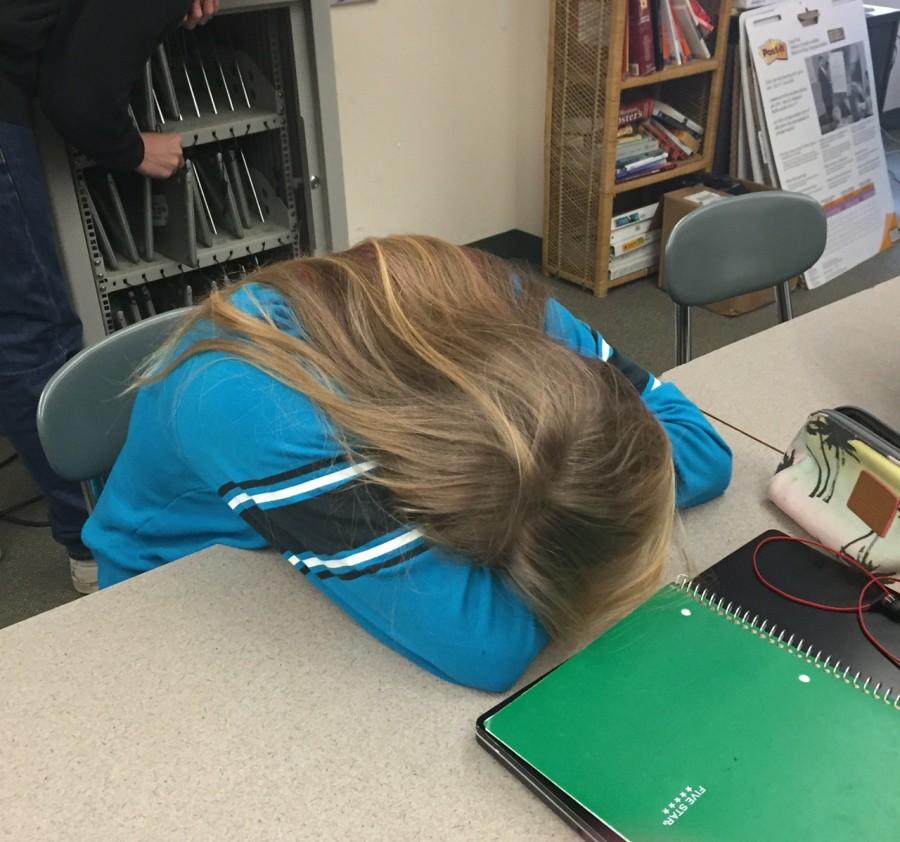Teens Need More Sleep!
March 30, 2016
According to raisingchildren.net, teens between the ages 12 and 15 are supposed to have “…9 ¼ hours of sleep each night.” When a teen from Ipswich High School is asked how much sleep he averages a night, he usually says, “at least 7 ½ hours a night”; however, he usually only gets “Six hours or less (of sleep) during the week.” The Ipswich Health Teacher, Judy Hoyle, stated that teens should get between “eight to nine hours a night.” Question: Can teens create better sleeping patterns for themselves?
Teens may not want to change their sleeping patterns because they feel okay, but helpguide.org states that, “If you’re getting less than eight hours of sleep each night, chances are you’re sleep deprived. What’s more, you probably have no idea just how much lack of sleep is affecting you.”
So how can you tell if you’re sleep deprived? In the article from helpguide.org it’s stated that you’re sleep deprived if “(You) need an alarm clock in order to wake up on time, rely on the snooze button, have a hard time getting out of bed in the morning, get sleepy in meetings, lectures, or warm rooms, get drowsy after heavy meals or when driving, or need to nap to get through the day.” So now you’re thinking of how that list fits in with you or a teen that you know. Maybe you are asking “What does it matter that this says I’m sleep deprived; I think I’m just not a morning person.” However, your body can’t function if it doesn’t have enough sleep. As raisingchildren.net states, “You need sleep to…maintain a healthy body, (for) ‘cleaning up’ the brain, helping the immune system, (and) improving energy levels, learning and concentrations.” Lack of sleep has a negative effect on your behavior, emotions, attention, social relationships, and school performance. Mrs. Hoyle stated that you need sleep “for rejuvenation, rest, and repairing the body.”
So now you might agree that you could use a few more hours of sleep every night, but what if you still want to have relationships with friends, have homework from school to do, want to play that new video game, or you want to spend time on the internet? Raisingchildren.net states that, “During puberty, children start to secrete melatonin (chemicals that tells your brain to put the body to sleep) later at night than they did in earlier childhood. This affects their circadian rhythm (sleep cycle). It means that (the teen) will want to go to bed later at night and get up later in the morning. Also, as their brains mature during puberty, children (teens) are able to stay awake for longer.” You may be thinking that you need more hours in the day to do everything, but it’s not the amount of sleep you need; it’s the quality of deep sleep that you get. Deep sleep consists of REM Cycles, and the more REM sleep you get, the better you will sleep. Sleep cycles last for about 90 minutes and teens are supposed to get around six cycles every night. Studies prove that on average, teens are not getting enough hours of quality sleep.
Now maybe you need to know how to get more sleep. Sleepfoundation.org says to get more sleep you should try to not, “eat, drink, or exercise within a few hours of your bedtime. Don’t leave your homework for the last minute. Try to avoid the TV, computer, and telephone in the hour before you go to bed. Stick to quiet, calm activities, and you’ll fall asleep much more easily!” You should also try to keep a steady routine for your sleeping, even on the weekends. Have a set time for going to sleep and calming down will get you the best quality of sleep over time. Maybe try finishing homework early, so that around 9:30 you can get to bed with little to no stress. Shut off electronics before going to sleep too, so that people who try to keep you up really late don’t bother your new sleeping patterns.
The sleeepfoundation.org states that “When you are sleep deprived, you are as impaired as driving with a blood alcohol content of .08%, which is illegal for drivers in many states. Drowsy driving causes over 100,000 crashes each year. Recognize sleep deprivation and call someone else for a ride.” It is evident that sleep is very important for you, and most studies say that teens need between 7-10 hours of sleep every night. Not getting enough sleep can be detrimental to your health and your education. It can be very hard to find hours in the day to get more sleep at night, but teens all need more sleep to stay healthy and function properly.
Citations
- “Sleep for Children: 12-15 Years.” Sleep for Teenage Children Aged 12-15 Years. N.p., n.d. Web. 21 Mar. 2016.
- “How Much Sleep Do You Need?” Signs That You’re Not Getting Enough and What to Do About It. N.p., n.d. Web. 21 Mar. 2016.
- “Child Sleep: Recommended Hours For Every Age.” WebMD. WebMD, n.d. Web. 21 Mar. 2016.
- “Article.” Eastern Economic Journal. N.p., n.d. Web. 21 Mar. 2016.
- “Teens and Sleep.” Sleep for Teenagers 2. N.p., n.d. Web. 29 Mar. 2016.

